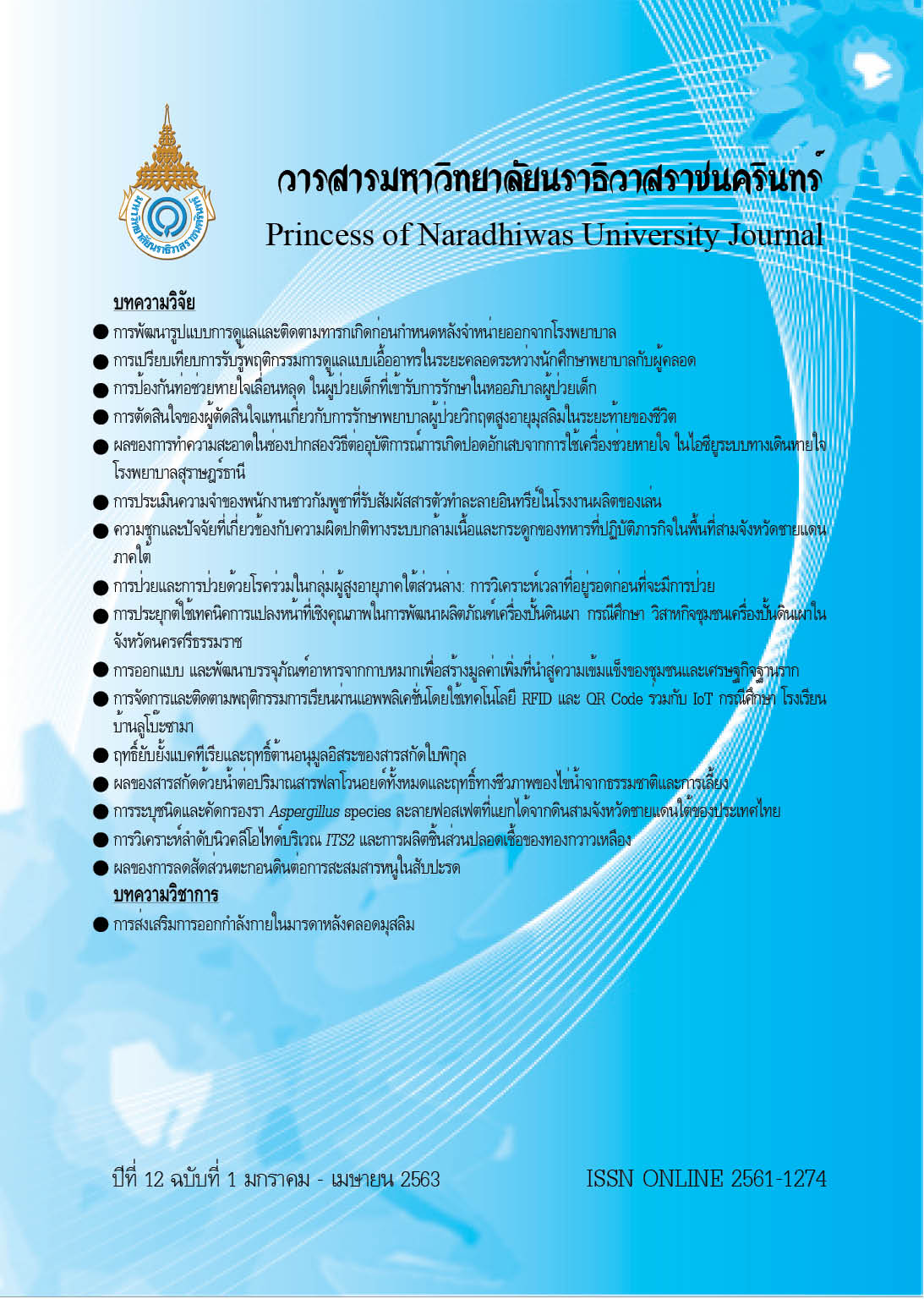[RETRACTED ARTICLE] Surrogate’s Decision Making Regarding Treatments of Critically Ill Muslim Older Patients at the End of Life
Keywords:
Decision making, Surrogate, Critically Ill Muslim Older PatientsAbstract
This article has been Retracted at the request of the Editor-in-Chief.
This research aimed to study treatment-related decision of surrogates of critically ill Muslim older patients at the end of life period. A sample of 120 surrogates of critically ill older persons receiving care in critical care and medical units at a provincial hospital were purposively selected. The questionnaire was use to collected data on personal characteristics and treatment-related decision making. Descriptive analysis and content were performed. Alpha’s Cronbach of instrument’s validity was 0.87.
The results revealed that 84.17% of the surrogates made a decision to continue life-prolonging treatments, either by giving full or limited treatments, 15.83% decided to withdraw the treatments, and 76.67% decided to give comfort treatments while withdrawing or continuing life-prolonging treatments. The reasons to prolong life with full treatment included surrogate’s wish to give the patient the best possible treatment, hoping for revival, being unable to accept death, and past experience. The reasons to prolong life with limited treatments included patient sufferings related to treatments, patient’s wish and patient’s advancing age. The decisions to discontinue treatments and take the patients home were based on a patient’s wish to die at home, deterioration of symptoms, andpatient sufferings. Surrogates who decided to give comfort treatments made this decision based on patient suffering related to critical illness and treatments. They limited physically distressing medical procedure and allowed pain killers to relieve patient suffering during the end of life.
References
Abu-El-Noor, N. I., & Abu-El-Noor, M. K. (2014). End of Life-Decisions: An Islamic Perspective. Online Journal of Health Ethics, 10(1), 1-19.
Adeniyi, O. B. (2013). Euthanasia as a contemporary issue in the jurisprudence of rights: The position of Islamic law. Yonsei Law Journal, 4(2), 85-112.
Attum, B., Waheed, A., & Shamoon, Z. (2019). Cultural competence in the care of Muslim patients and their families. StatPearls Publishing LLC.
Bloomer, M. J., & Al-Mutair, A. (2013). Ensuring cultural sensitivity for Muslim patients in the Australian ICU: Consideration for care. Australian Critical Care, 26(4), 193–196.
Braganza, M.A., Glossop, A. J., & Vora, V.A. (2017). Treatment withdrawal and end-of-life care in the intensive care unit. The British Journal of Anaesthesia, 17(12), 396–400.
Choong, K.A. (2015). Islam and palliative care. Global Bioethics, 26(1), 28-42.
Dhami, S., & Sheikh, A. (2000). The Muslim family predicament and promise. Western Journal of Medicine,173(5), 352-356.
Esteve, A., Jimenez, C., Perez, R., & Gomez, J.A. (2009). Factors related to withholding life-sustaining treatment in hospitalized elders. The Journal of Nutrition Health and Aging, 13(7), 644-650.
Hemman, M., Nilmanat, K., & Matchim, Y. (2017). Caring for patients with end-stage renal disease receiving palliative care: Muslim caregivers, experinces. Princess of Naradhiwas University Journal, 9(1), 50-59.
Hurst, S.A., Hull, S.C., DuVal, G., & Danis, M. (2005). How physicians face ethical difficulties: a qualitative analysis. The Journal of Medical Ethics, 31, 7–14.
Jehloh, L., Nilmanat, K., & Kongsuwan, W. (2019). Surrogates’ decision making process regarding treatments for critically ill elderly Muslim patients at the end stage of life. Princess of Naradhiwas UniversityJournal, 11(3), 82-92
Jox, R. J., Schaider, A., Marckmann, G., & Borasio, G.D. (2012). Medical futility at the end of life: the per spectives of intensive care and palliative care clinicians. The Journal of Medical Ethics, 38, 540–545.
Klinmalee, P. (2015). Surrogates’ Decision Making and Its’ Outcomes Regarding Treatments for BuddhistCritically Ill Patients at the End Stage of Life. Prince of Songkla University, Songkhla. (in Thai)
Larijani, B., & Zahedi, F. (2007). Religious perspective in end of life ethical issues. Iranian Journal of Diabetes and Lipid Disorders, 6, 9–23.
Layde, P.M., Beam, C.A., Broste, S.K., Connors, A.F. Jr, Desbiens, N., Lynn, J.,…Vidaillet, H.(1995). Surrogates’ predictions of seriously ill patients’ resuscitation preferences. Archives of Family Medicine, 4, 518–523.
Luce, J.M., & White, D.B. (2007). The Pressure to Withhold or Withdraw Life-sustaining Therapy from Critically Ill Patients in the United States. American Journal of Respiratoryand Critical Care Medicine, 175(11), 1104-1108.
Manalo., M. F. C. (2013). End-of-Life Decisions about Withholding or Withdrawing Therapy: Medical, Ethical, and Religio-Cultural Considerations. Palliative Care : Research and Treatment, 7, 1–5.
Nilmanat, K., Matchim, Y., Manasurakarn, J., Kongsuwan, W., Meesunthorn, K., & Prompahakul, C. (2016).Terminal patient care in a Muslim community: A case study in a southern- Thai context. Thai Journal of Nursing Council, 31(3), 37-52.
Onwuteaka-Philipsen, B.D., van der Heide, A., Koper, D., Keij-Deerenberg, I., Rietjens, J.A.,Rurup, M.L. et al. (2003). Euthanasia and other end-of-life decisions in the Netherlands in 1990, 1995, and 2001.The Lancet, 362(9381), 395-399.
Platt, M. (2010). Pain Challenges at the End of Life - Pain and Palliative Care Collaboration. Reviews in Pain, 4(2), 18-23.
Polit, D.F., & Beck, C. T. (2012). Nursing research: Generating and assessing evidence for nursing practice (9th ed.). Wolters Kluwer Health/ Lippincott Williams & Wilkins.
Sahmaae, N., Nilmanat, K., & Kongsuwan, W. (2014). Experience of Muslim caregiver in caring for end stage of life in critically ill patients in an intensive care unit. Princess of Naradhiwas University,6(1), 48-59.
Schultz, M., Baddarni, K., & Bar-Sela, G. (2012). Reflections on palliative care from the Jewish and Islamictradition. Evidence-Based Complementary and Alternative Medicine.
Srisatidnarakul, B. (2007). The meyhodology in Nursing Research (4th ed). Bangkok: You &I Intermedia Printing. (in Thai)
Tayeb, M.A., Al-Zamel, E., Fareed, M.M., & Abouellail, H. A. (2011). A “good death”: perspectives of Muslim patients and health care providers. Annals of Saudi Medicine, 30(3), 215–221.
Thelen, M. (2005). End-of life decision making in intensive care. Critical Care Nurse, 25(6), 28-37.
Waeteh, S., Nilmanat, K., & Songwathana, P. (2009). Caregivers’ experiences in providing care for Muslim patients with terminal AIDS. Thai Journal of Nursing Council, 24(4), 95-109.
Downloads
Published
How to Cite
Issue
Section
License
Copyright (c) 2019 Princess of Naradhiwas University Journal

This work is licensed under a Creative Commons Attribution-NonCommercial-NoDerivatives 4.0 International License.




